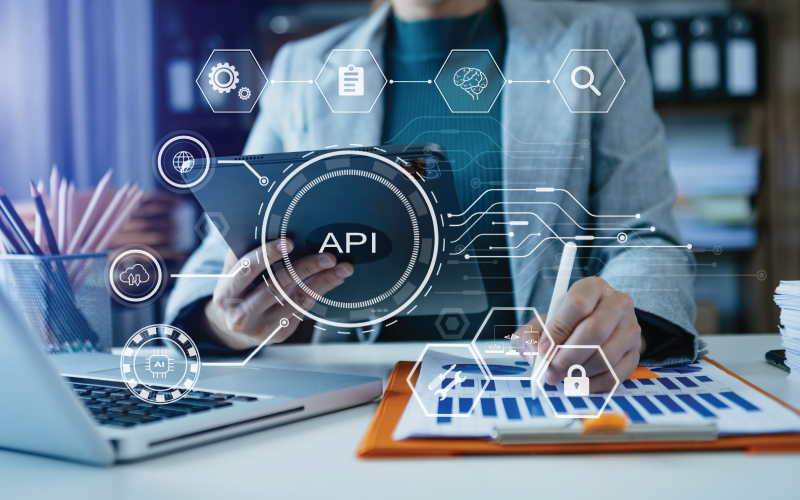Blog

Gen AI and APIs - A "Symbiotic" Relationship

Sanjay Kalra, VP, Digital Transformation and Head, Alliances
Sanjay is our Digital Transformation Sherpa, who guides our customers and Intelliswift’s solutions and engineering teams at Intelliswift. As a trusted advisor, he helps clients achieve their business transformation goals, leveraging a mix of digital technologies including AI, Automation, Cloud, and Data Analytics for impactful business results.
1. How do you define "Gen AI" in the context of technology and its impact on society?
To answer that, I’d like to quote Sundar Pichai, CEO of Google - “Generative AI is the bridge between data and imagination, enabling us to dream up new realities.” Indeed, the impact of GenAI is limited only by our imagination. What started off as a science experiment for users to input prompts and generate new content, such as text, images, video, and music, Gen AI is already disrupting professions and industries. Its ability to write software code, test cases and documentation has resulted in 20-40% increased productivity. Its applications in things as varied as drug design and material science are just the beginning. As it evolves, GenAI will impact collaboration, decision-making, and creativity, revolutionizing how humans and machines work together.
2. How are APIs (Application Programming Interfaces) facilitating the integration and utilization of Gen AI technologies in various industries?
For GenAI to achieve its potential in real world applications, APIs serve as the bridge between generative models and business applications. APIs empower connecting GenAI to data, devices, and processes. Whether fetching information, executing tasks, or simplifying complex user interfaces, APIs are the hands and legs that enable generative AI’s creative thinking.
3. Can you explain how Gen AI and APIs collaborate to solve complex problems or enhance user experiences?
The collaboration between Generative AI and APIs drives innovation across industries, enabling organizations to address real-world challenges effectively. APIs facilitate interaction with AI models, allowing users to provide feedback for performance enhancement and alignment with human expectations. Additionally, APIs enable integration of explainability features, promoting transparency and trust in AI solutions.
In healthcare, AI diagnostic platforms utilize APIs to analyze medical images, enhancing accuracy in detecting abnormalities. Similarly, APIs bolster security measures in finance, enabling AI-driven fraud detection systems to swiftly identify suspicious patterns, safeguarding financial institutions and customers.
4. What challenges or limitations do organizations face when leveraging Gen AI through APIs, and how can they overcome these obstacles?
While integrating Gen AI models with APIs offers numerous benefits, there are several challenges that need to be addressed:
a. Data Privacy and Security: Gen AI models require large datasets, raising concerns about data privacy and security. Organizations must ensure proper authentication, encryption, and auditing of data access.
b. Model Bias and Fairness: Inherent biases in training data can lead to unfair outputs. Mitigating biases in both data and models is essential.
c. Scalability and Performance: As models and data volume grow, maintaining scalability and performance becomes challenging, requiring robust infrastructure and load balancing.
d. Model Updating and Versioning: Frequent model updates require careful management of version control and compatibility.
e. Interpretability and Explainability: Ensuring model outputs are interpretable, especially in sensitive domains like healthcare, finance and legal is crucial.
f. API Consistency and Reliability: Changes or downtime in APIs can disrupt integration. Robust error handling and monitoring are necessary.
g. Cost and Resource Management: Accessing Gen AI models via APIs can be costly. Effective resource management is needed.
h. Regulatory Compliance: Industries like finance, healthcare and government have strict regulations. Compliance with data privacy and transparency is vital.
i. User Trust and Adoption: Building user trust, especially in sensitive domains, is key for adoption.
Addressing these challenges requires technical solutions, governance frameworks, and collaboration among stakeholders.5. How do privacy and ethical considerations factor into developing and deploying Gen AI-driven solutions via APIs?
Ensuring privacy and ethics in Gen AI-driven solutions deployed via APIs is crucial for building a responsible digital future. Organizations must uphold ethical principles like fairness, transparency, and accountability throughout AI development. This includes conducting impact assessments to identify biases or risks in AI models and taking steps to mitigate them. Protecting user privacy and data is essential. Techniques like differential privacy and federated learning help minimize unauthorized access or misuse of sensitive data. By embedding privacy and ethics into AI solutions, organizations build trust with users and stakeholders, ensuring their systems have a positive impact on society.
6. Are there specific industries or use cases where the synergy between Gen AI and APIs is particularly pronounced or transformative?
The integration of Gen AI and APIs is especially impactful in healthcare and finance, but its benefits extend across various sectors:
Healthcare:
- Gen AI models trained on medical data aid in disease diagnosis, treatment planning, and drug discovery.
- These models integrate with APIs offering access to electronic health records (EHRs), medical research, and clinical trial data. For instance, they can analyze a patient's EHR data alongside medical research to offer personalized treatment recommendations.
- AI-powered virtual assistants leverage Gen AI and APIs to provide patients with tailored health information, appointment scheduling and medication reminders.
Financial Services:
- Gen AI models assist in stock market analysis, risk assessment, fraud detection, and portfolio management.
- They integrate with APIs providing financial data, news feeds, and regulatory information to generate trading recommendations and investment opportunities.
- Gen AI enhances transparency in financial decisions by generating natural language reports.
Retail and E-commerce:
- Gen AI models power product recommendation engines, personalized marketing campaigns, and customer support chatbots.
- They analyze customer data to offer personalized product recommendations and marketing content.
- Conversational AI assistants leverage APIs to provide real-time order tracking and personalized support.
Cybersecurity:
- Gen AI models detect and respond to cyber threats like malware, phishing attacks and network intrusions.
- They integrate with APIs offering access to threat intelligence databases, security logs and network monitoring data.
- Gen AI simplifies threat analysis by generating natural language reports and alerts.
7. What advice would you give to organizations looking to harness the potential of Gen AI and APIs effectively while ensuring responsible and sustainable implementation?
Organizations looking to harness the potential of Gen AI and APIs effectively must adopt a strategic approach that balances innovation with responsibility. Firstly, organizations must invest in building internal AI capabilities, including talent acquisition, skill development, and infrastructure investment, to ensure they have the necessary expertise and resources to develop and deploy AI-driven solutions effectively. Secondly, organizations should foster a culture of experimentation and learning, encouraging cross-functional collaboration and knowledge sharing to drive innovation and accelerate AI adoption. Thirdly, organizations must prioritize ethical considerations, data governance, and regulatory compliance to ensure responsible and sustainable AI implementation that delivers long-term value to businesses and society.





